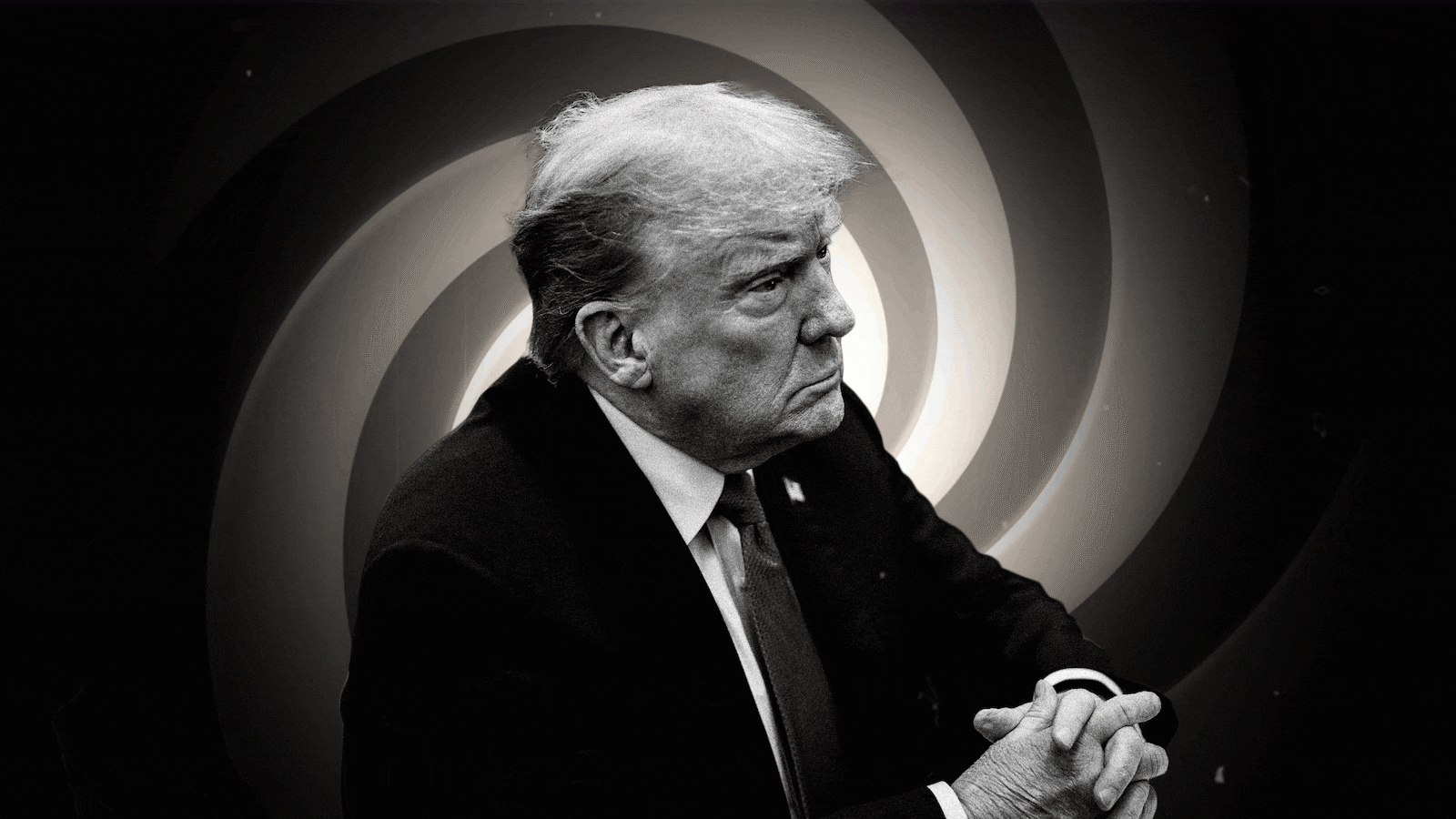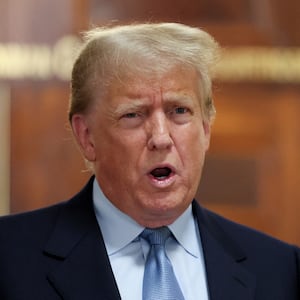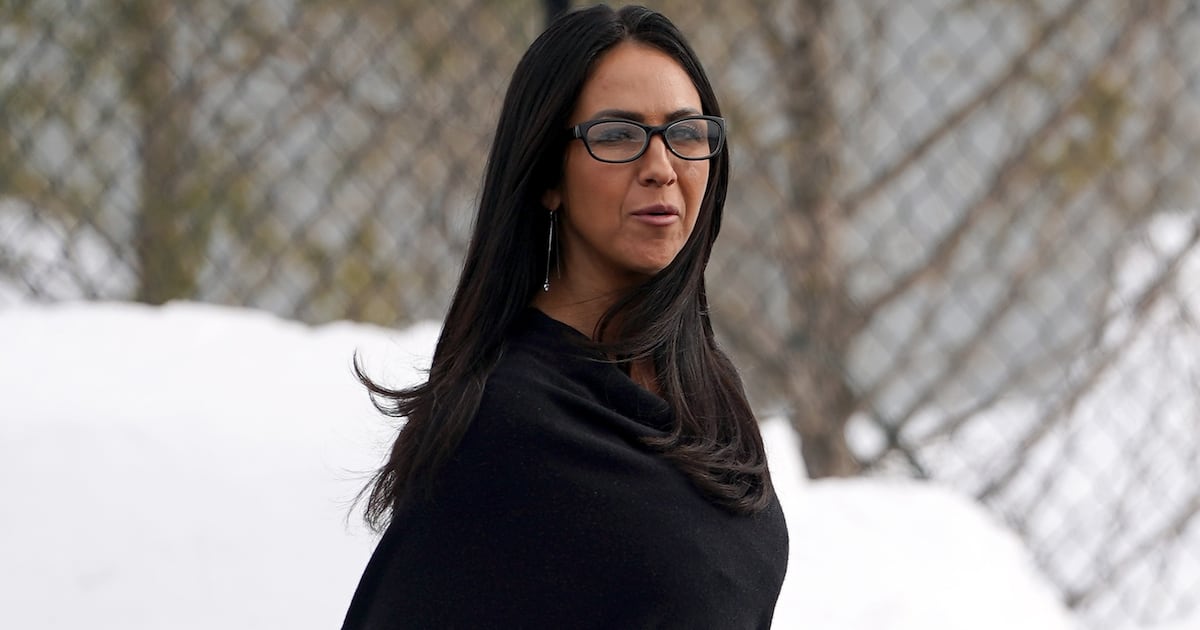Halfway through Donald Trump’s bank fraud trial in New York, the former president is running out of viable options—and his lawyers have shifted their focus from trying to win in this downtown courtroom to a full-on attack against the judge and his top adviser.
But even as Justice Arthur F. Engoron tries to fence them in with gag orders showing increasing alarm that Trump’s heated rhetoric could inspire violence from MAGA loyalists, the Republican firebrand is managing to skirt the limits by relying on outside help.
The latest came on Friday, when Rep. Elise Stefanik (R-NY) filed an ethics complaint with a state court commission against Engoron and his law clerk, the attorney Allison Greenfield, citing “inappropriate bias and judicial intemperance.”
It’s an extension of the Trump team’s growing resentment in the courtroom, where the fight is starting to get personal.
On the horizon is a ploy by Trump’s lawyers to interrupt the three-month court battle with an outsized request: the declaration of a complete mistrial, pointing to the way Engoron regularly converses with Greenfield before consistently shooting down the billionaire’s legal arguments. They alluded to using this tactic but haven’t filed anything yet.
“We’ll be filing papers to address all of those issues… soon, very soon,” Alina Habba, one of Trump’s leading attorneys in the case, told Fox News host Maria Bartiromo on Sunday.
It’s a nuclear option, albeit a warhead that’ll likely be a dud, given that Engoron has repeatedly declined to pause the proceedings or even reconsider past rulings.
This potential avenue of attack first came up on Nov. 3, the same day that state investigators questioned Trump’s son Eric on the stand. Defense lawyer Christopher Kise brought up a complaint sent by a Wisconsin-based Twitter troll, who goes by @JudicialProtest and filed a court complaint about the political leanings of Greenfield, citing, among other things, the whopping $35 she recently donated to two Democrats on the New York City Council.
In court, Kise noted what he called “the appearance of impropriety,” saying that “certainly it forms at least in my mind a basis for raising a question of potential bias.” He then dangled the threat of employing that nuclear option, claiming “the defense will have to give serious consideration to seeking a mistrial” given Greenfield’s “continuous input.”
“We all need to take this very seriously because the entire world is watching, and none of us can afford to misstep,” Kise warned.
The ad hominem attacks are a completely different approach from the one being used by New York Attorney General Letitia James, who remains focused on the facts in the case. Her lawyers have spent six weeks questioning witnesses in an attempt to show that Trump routinely lied on his personal financial statements to score bigger and better bank loans for real estate development projects.
Meanwhile, defense attorneys have been trying to poke holes in that narrative with little success, as the judge keeps paring down their questions and rejecting their sermons lambasting this as a mere political prosecution.
“This is not a political rally,” Engoron had to remind Trump when the AG put him on the witness stand last week.
So far, the Trumps have scored a single victory in court: seriously calling into question the credibility of a key AG witness, Trump’s lawyer-turned-nemesis Michael Cohen.
But failing to explain why the real estate mogul tripled the actual size of his Trump Tower triplex, defense lawyers have instead taken turns chalking up Trump’s “genius,” ridiculing his former accountant for “crying” at the White House, and reminded the courtroom crowd that Trump was busy trying to “keep this country safe” while in office. However, Engoron has shown no patience for the theater on display, at one point spending considerable time correcting defense lawyer Jesus Suarez’s pronunciation of the word “triplex.”
In response, the defense team’s boiling anger has turned from the AG’s office to the judge, on whom the fate of the entire case relies. The shift is most evident from Kise’s changing demeanor. Although the former Florida solicitor general leans heavily on his Southern charm, his genteel approach with Engoron has been replaced with outright hostility. At every turn, he now warns the judge that his comments “make a poor record” that will surely come up on appeal.
That’s partly because Trump lost the bulk of the case before it ever got started. In late September, Engoron awarded the AG a decisive victory when he determined that Trump, two of his sons, and top executives did indeed commit bank fraud over a decade—and deserve to have their corporation yanked from their hands.
The trial that started on Oct. 2 was instead concerned with what was left in the AG’s lawsuit: the extent to which the Trumps faked business records, lied on the billionaire’s personal financial statements, and engaged in insurance fraud—and how damaging the punishment should be. The AG has asked for $250 million, but Engoron could decide to snatch away much more than that from Trump’s bank accounts.
With the stakes this high, it’s no surprise Trump keeps appearing in court despite having no obligation to do so. Just like with his visceral attacks against the nation’s voting system when he lost his re-election bid in 2020, Trump is turning his firehose toward the judicial system itself.
The idea of tainting the trial this way follows the defense team’s overall strategy of essentially cutting its losses by turning away from the present court battle, choosing instead to litter legal landmines all over the court record in a hope to revive this fight in a higher court on appeal.
It’s a desperate move. During a radio interview on WNYC last week, former federal prosecutor Andrew Weissmann joined the many legal scholars monitoring the case who have quoted the American poet Carl Sandburg: “If the facts are against you, argue the law. If the law is against you, argue the facts. If the law and the facts are against you, pound the table.”
But Trump’s team has gone far beyond that, leaving their red-faced and flustered billionaire client to pound the table—literally at times—while his lawyers have ditched any semblance of professionalism by resorting to snide remarks against Engoron and insults directed at Greenfield. Their scorn inside the courtroom—and Trump’s barrage of insults just outside the heavy wooden double doors—have resulted in rare gag orders barring all of them from continuing their campaign of blistering invective.
In one courthouse rant, he called Engoron’s clerk a “disgrace.” In another, he complained that the judge’s clerk “should not be allowed to be in his ear on every single question.”
“You take a look at what’s happening with her,” he said. “She hates Trump more than he does.”
The very first gag order came on just the second day of trial, when Engoron forbade Trump from directing his fiery press conference speeches and conspiracy-laden social media posts at court staff. That issue came back with a vengeance at the end of week three, when the judge discovered that Trump’s presidential campaign violated the first gag order by failing to pull down an internet post laced with lies that, in typical Trump fashion, tried to vilify the clerk by deriding her as the “girlfriend” of Senator Chuck Schumer (D-NY), a favorite GOP scapegoat who easily draws MAGA ire. The second episode cost Trump $5,000 and a stern warning.
Never one to learn his lesson, Trump managed to infuriate the judge a third time in week four, when he tried to deliver a sly taunt against Greenfield just outside the courtroom without referencing her by name. The judge immediately dragged him onto the witness stand, essentially called him a liar for denying it, and fined him $10,000—warning him that a short stint in prison could be next.
But Trump’s ballooning anger soon transferred over to his lawyers, who took up the personal fight against Greenfield directly in court, resulting in an extraordinary gag order against the legal team itself.
This simmering rebellion has turned a doomed trial into a political fundraiser for Trump’s 2024 presidential campaign, one that foreshadows how Trump might approach his long string of criminal trials across the country early next year.
But it’s far from over.
Monday marks the start of the defense team’s presentation, in which the billionaire’s lawyers will recycle the same arguments that failed to convince the judge during the three-year investigation he oversaw. Their view, in sum, is that Trump was justified when he vastly inflated the values of his Monopoly board collection of properties on Fifth Avenue and Wall Street. After all, everybody fibs a little—and banks that still profited handsomely didn’t exactly get duped.
The pending defense witness line-up is telling. First up is Donald Trump Jr., a defendant in the case who already testified at trial by pushing the blame for any financial irregularities on the company accountants. He isn’t expected to say anything new.









